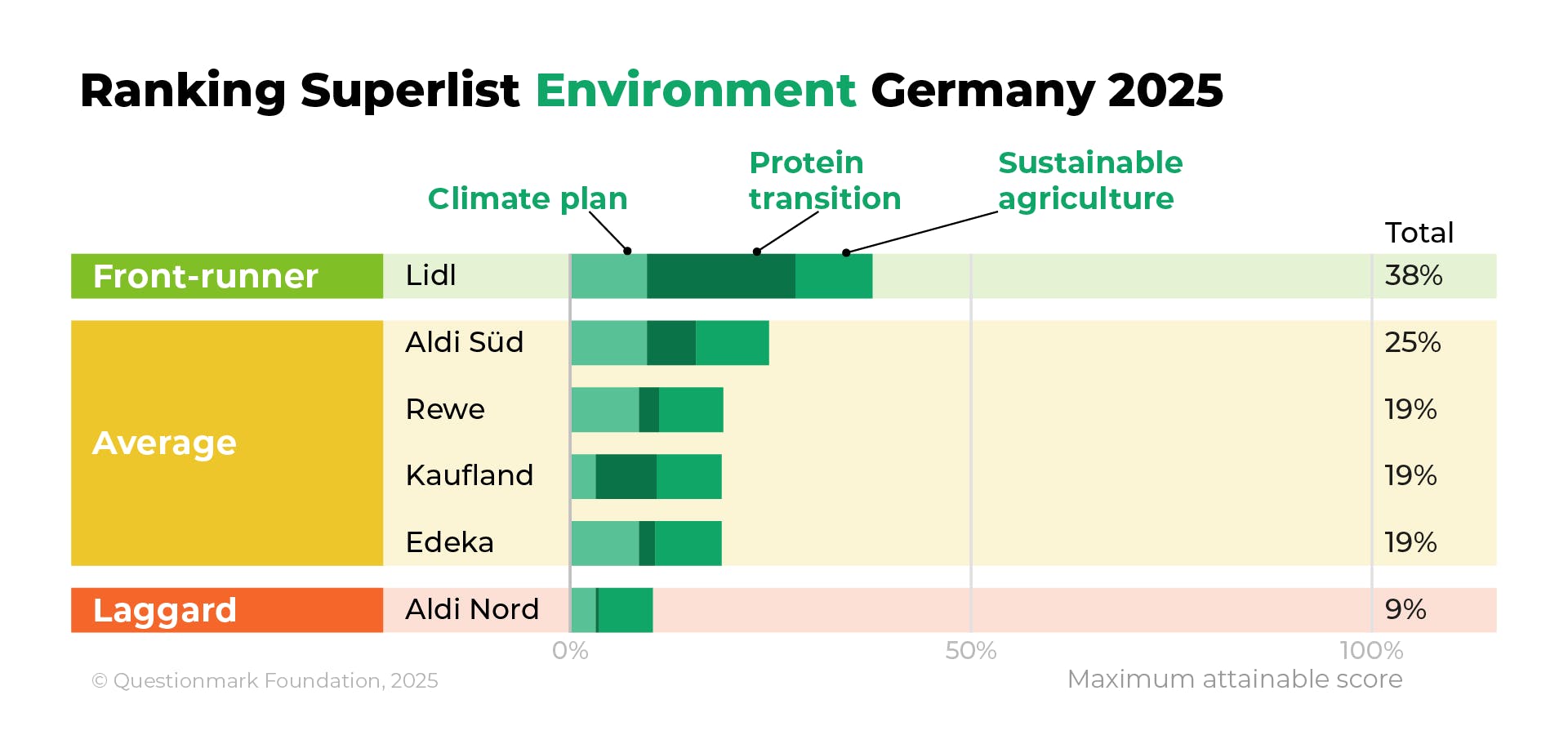Supermarkets far from sustainable, need to step up their green game
New Study: Discounters Lidl and Aldi Süd ahead of full-range supermarkets Rewe, Edeka, and Kaufland
Berlin, April 22 – Supermarkets in Germany have a long way to go towards becoming more sustainable, shows new Superlist Environment research. On paper, supermarkets show ambition with their climate goals and plant-based protein sale targets. But in practice, climate roadmaps are missing, animal proteins account for 90% of promotions and none of the supermarkets are transparent about the share of their assortment covered by sustainability certificates. High time for supermarkets to take on responsibility to help shape a more sustainable food environment.

Superlist: first ranking of German supermarkets’ sustainability efforts
With Superlist Environment, think tank Questionmark has compared and ranked six of the largest German supermarkets: Aldi Nord, Aldi Süd, Edeka, Kaufland, Lidl and Rewe. Questionmark assessed supermarkets’ efforts on developing climate plans, encouraging plant-based over animal-based sales, and stimulating sustainable agriculture practices. Questionmark worked together with the Albert Schweitzer Foundation, Madre Brava, the Physicians Association for Nutrition and ProVeg. All supermarkets were consulted on the methodology and collected data.
Discounters ahead of full-range retailers
Lidl Germany leads in sustainability efforts, mainly with its clear commitment to shift protein sales from animal- towards plant-based. The retailer reports on its share of both animal- and plant-based proteins in their total quantity of received goods and is aiming for 60% plant-based by 2050. Aldi Süd follows in the ranking, lagging behind Lidl for not yet setting a plant-based protein sales or product range target. Both discounters are ahead of Rewe, Kaufland and Edeka. Aldi Nord ranks last, notably because it does not report or have actions on its greenhouse gas emissions directly related to food and has not yet taken any measures to reduce them. “The retailers that have announced sustainability targets have taken an important first step that needs to be followed up by action. We are hopeful, this first German Superlist inspires the entire food retail industry in the race towards more responsible retail operations” concludes Charlotte Linnebank, director at Questionmark.
Plant-based food needs boost
The shift towards more plant-based sales is one of the most effective ways to reduce the negative environmental impact of the food system. In general, plant-based dietary patterns have a lower negative impact on the climate, the environment, human health and animals. But in all researched supermarkets, animal products still account for over 90% of protein promotions. Also, nearly 70% of ready-to-eat meat products, such as schnitzels, are extra large (over 150 grams). The Planetary Health Diet, a global reference diet that is healthy for both planet and people, recommends consumers eat only about 100 grams of red meat per week.
However, there are also positive developments. Edeka, Kaufland and Lidl have committed to offering private label plant-based alternatives for the same price as animal-based counterparts. Lidl makes it easier for customers to choose plant-based products by placing them between meat products. Strategically, Lidl has set a target to improve the share of plant-based versus animal-based protein sales.
Supermarkets play key role
As Germans buy over 70% of their food in supermarkets, retailers are a key link in the food chain (Gastrotel, 2025; LZ, 2025; DBV, 2025). Supermarkets therefore play a crucial role for achieving a sustainable food system. They can ensure that the food on their shelves is produced in an environmentally sustainable manner and that promotions and store layouts help customers fill their shopping baskets with low-impact products. A follow-up to this first Superlist will monitor whether supermarkets have indeed stepped up their green game.